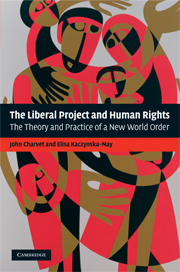Book contents
- Frontmatter
- Contents
- List of abbreviations
- Preface
- Introduction: what is liberalism?
- Part I Liberal beginnings
- Part II The UN regime on human rights
- 4 The UN and regional declarations and covenants on human rights
- 5 The right of peoples to self-determination
- 6 The right to development and development assistance
- 7 Women's international human rights
- 8 The implementation of international human rights
- Part III Critique and defence of liberalism
- Notes
- Index
5 - The right of peoples to self-determination
Published online by Cambridge University Press: 04 June 2010
- Frontmatter
- Contents
- List of abbreviations
- Preface
- Introduction: what is liberalism?
- Part I Liberal beginnings
- Part II The UN regime on human rights
- 4 The UN and regional declarations and covenants on human rights
- 5 The right of peoples to self-determination
- 6 The right to development and development assistance
- 7 Women's international human rights
- 8 The implementation of international human rights
- Part III Critique and defence of liberalism
- Notes
- Index
Summary
Who possesses this right?
We have not yet discussed a right that is given great prominence as Article 1 in both the ICCPR and the ICESCR. The article expresses the right thus: ‘All peoples have the right of self-determination. By virtue of that right they freely determine their political status and freely pursue their economic, social and cultural development.’ Such a right is not mentioned in the Universal Declaration of Human Rights. However, Chapter I Article 2 of the UN Charter states that one of the purposes of the UN is ‘to develop friendly relations among nations based on respect for the principle of equal rights and self-determination of peoples’. Article 55 reiterates this language. Yet, it is doubtful whether the authors of the charter intended the right to be understood with quite the same meaning that it had acquired by the time it was given pride of place in the UN's two main human rights covenants.
This meaning was effectively defined by the 1960 UN General Assembly Declaration 1514 On the Granting of Independence to Colonial Countries and Peoples. The Declaration was the first to use the formula quoted above and by doing so specifically in the context of the decolonization process gave it the implications that have subsequently been attached to it. The Declaration was adopted by eighty-nine votes with nem con, although the European colonial powers and the United States abstained.
- Type
- Chapter
- Information
- The Liberal Project and Human RightsThe Theory and Practice of a New World Order, pp. 110 - 135Publisher: Cambridge University PressPrint publication year: 2008



